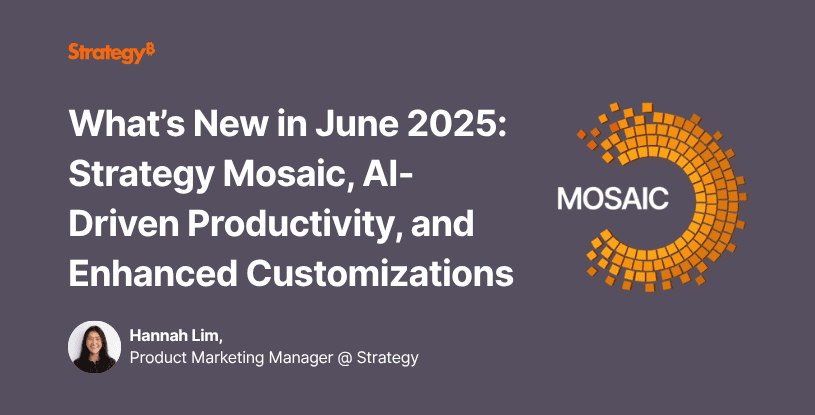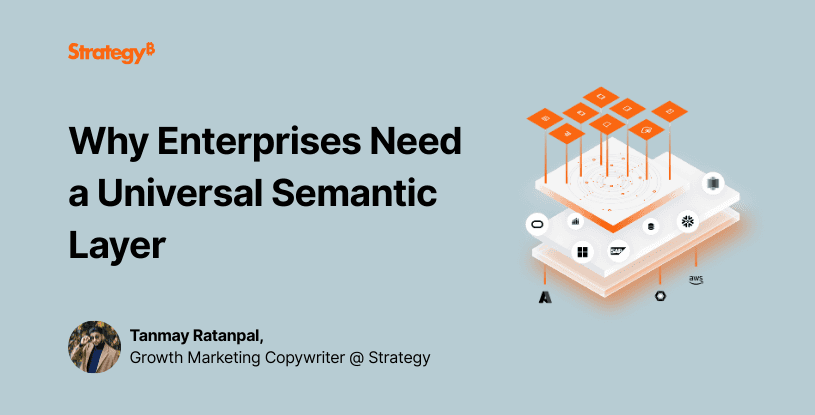Why is Governed Data Important for Enterprises?
In today’s data-driven landscape, enterprises are flooded with information, but struggle to trust it. Disconnected tools, inconsistent metrics, and siloed teams hinder decision-making, making it slow and prone to error. Data governance provides a framework where data is accurate, secure, and consistently defined—empowering enterprises to move fast, stay compliant, and act confidently.
In this blog, we’ll break down what governed data really means, why it matters, how industries benefit, and how Strategy One enforces data governance through its Universal Intelligence Layer—the modern foundation for AI-ready, enterprise-scale analytics.
What is Governed Data?
As an enterprise, you've got data coming from all sides—from sales records and financial statements to market research and social media. That data is collected, stored, and processed for reporting and analysis.
But if it's kept in separate systems, departments can't connect insights to see the bigger picture—missing valuable opportunities. And if it's saved without clear definitions, KPIs get misunderstood—causing inconsistencies in reporting.
Governed data refers to information that's centrally defined, consistently managed, and tightly controlled across systems and users.
This process is called Data Governance and typically includes the following:
- Policies: Internal rules that define how data is handled, shared, and secured
- Access controls: Permissions that determine who can see or modify specific datasets
- Metadata standards: Guidelines for labeling and structuring data so it's easy to track and understand
- Data stewardship models: Roles and responsibilities for maintaining high-quality, accurate data
- Compliance protocols: Processes that ensure your data practices meet legal and regulatory standards
Why is Governed Data Important?
Data drives every decision across your enterprise. Any risk to data quality, security, or user access can create misalignment and wreak havoc on your reputation.
Data governance ensures access to the highest-quality data—delivering clear, consistent, and accurate insights to every report and dashboard.
- Aligns Departments: Governed data ensures that every team works from the same definitions. From “prospects” to “click-through rate,” each department uses the same definitions for KPIs and metrics. No guesswork, no confusion.
- Improves Decision-Making: Governed data allows leadership to leverage reports and dashboard data with confidence because the logic behind each visualization and metric is consistent and centrally managed.
- Reduces Regulatory Risks: Data governance ensures regulatory compliance and protects the enterprise from regulatory penalties, data leaks, or audit failures. It allows executives to monitor each data source from every application—on one secure platform.
- Supports AI-Powered Analytics: Governed data enables enterprises to leverage GenAI capabilities and unlock deeper insights. By supporting features like data modeling to AI-powered forecasting, governed data makes business intelligence proactive, not reactive.
Simply put, governed data eliminates data chaos. It minimizes data fragmentation, duplication, and inaccuracy—and improves data security and traceability.
Benefits of Governed Data Across Industries
At each stage of a digital campaign, business process, or customer interaction, data is created. Analysis of this data can lead to insights that impact future campaigns, transform existing operations, and increase customer engagement.
A well-governed data infrastructure doesn't just streamline data—it operationalizes it, making data a driving force behind every enterprise's success.
Discover the benefits of governed data across industries.
🛒 RETAIL
Improved Demand Forecasting: Retail businesses can leverage consistent historical sales data to predict demand, optimize stock levels, and reduce excess inventory.
Personalized Customer Experiences: Governed data across customer touchpoints allows retailers to build 360-degree customer profiles, improving segmentation and targeted marketing efforts.
Efficient Pricing Strategies: Consistent and accurate data ensures that retailers can adjust pricing models based on real-time market conditions, competitor analysis, and internal sales data.
🏦 FINANCIAL SERVICES
Regulatory Compliance: Governed data ensures that financial institutions stay compliant with financial regulations, reducing the risk of legal complications.
Improved Risk Management: Financial firms can better manage credit risk, market risk, and operational risk by ensuring accurate, consistent data across systems.
Enhanced Customer Insights: Financial organizations gain a clear view of customer financial profiles, enabling them to offer tailored products and services.
⚕️ HEALTHCARE
Improved Patient Care Coordination: Patient information is consistently available across departments, improving care coordination and delivering personalized support.
Compliance with Health Regulations: Controlled, secure access to patient data ensures that HIPAA and other health data regulations are met while reducing the risk of breaches.
Administrative Efficiency: Healthcare providers can streamline administrative processes like billing, scheduling, and staffing by accessing reliable data from different departments and systems.
🛠️ MANUFACTURING
Optimized Supply Chain Management: Manufacturers can streamline the flow of materials and products—improving inventory management, supplier relationships, and demand forecasting.
Improved Production Efficiency: Live, consistent data from production lines ensures better tracking of performance metrics, allowing for improved quality control and faster response times to issues.
Cost Reduction: Access to accurate data across all stages of production and supply allows manufacturers to optimize processes, cut waste, and reduce operational costs.
🌐 TECHNOLOGY
Accelerated Product Development: Consistent, governed data across product, user, and market insights allows tech enterprises to iterate on product features and optimize user experiences quickly.
AI-Driven Insights: Clean, governed data fuels AI and machine learning models, enabling tech companies to offer smarter products, predictive analytics, and more accurate trend forecasting.
Better Collaboration: With standardized data definitions, development, marketing, and product teams can all work from the same set of insights, improving cross-departmental collaboration and decision-making.
Governed data is only as effective as the system that enforces it. Many platforms promise governance—but rely on fragmented processes or lack the architectural depth to deliver it at scale. That’s where Strategy One stands apart.
How Strategy One Ensures Governed Data
Strategy One governs data through its Universal Intelligence Layer, an enterprise-grade semantic layer that sits above the data.
The Universal Intelligence Layer is powered by Strategy One’s Semantic Graph—an engine that organizes, connects, and defines data across an enterprise.
It allows administrators to set up access rules based on user roles, groups, or departments, ensuring sensitive data is secure.
It creates consistent definitions, ensuring all teams, departments, and systems rely on the same metrics for their reporting, analysis, and decision-making.
It leverages a cloud-native architecture, offering a single, unified platform to manage and govern all data assets—while delivering scalability and flexibility.
It provides up-to-the-minute data synchronization, allowing users to interact with the latest insights using advanced dashboards.
Unlike other platforms that separate governance from analytics, Strategy One unifies both through its Universal Intelligence Layer—making data consistent, auditable, and decision-ready.
Cleanse, structure, connect, and integrate your data—all in one seamless workflow.






